When you want to buy a Tesla electric car, and you\’ve got four kids, there\’s only one choice on the market.
That\’s the 2016 Tesla Model X six- or seven-seat SUV, and courtesy of an owner in just that situation, we\’ve finally been able to spend a few hours driving the luxury crossover.
Unlike other automakers, Tesla Motors almost never makes cars available to the media—so it took until last month for us to get behind the wheel.
DON\’T MISS: 2016 Tesla Model X – full review
Our test vehicle was a black Model X P90D delivered earlier this year to an affluent suburban neighborhood in the Northeast.
While it had fewer than 3,000 miles on it, the Model X had already transported the family of six on a couple of long road multi-state road trips, using Tesla\’s Supercharger network of DC fast-charging stations.
The owner said the car had behaved perfectly, and he\’d already received a notice from Tesla about the recall to update a seat mounting.
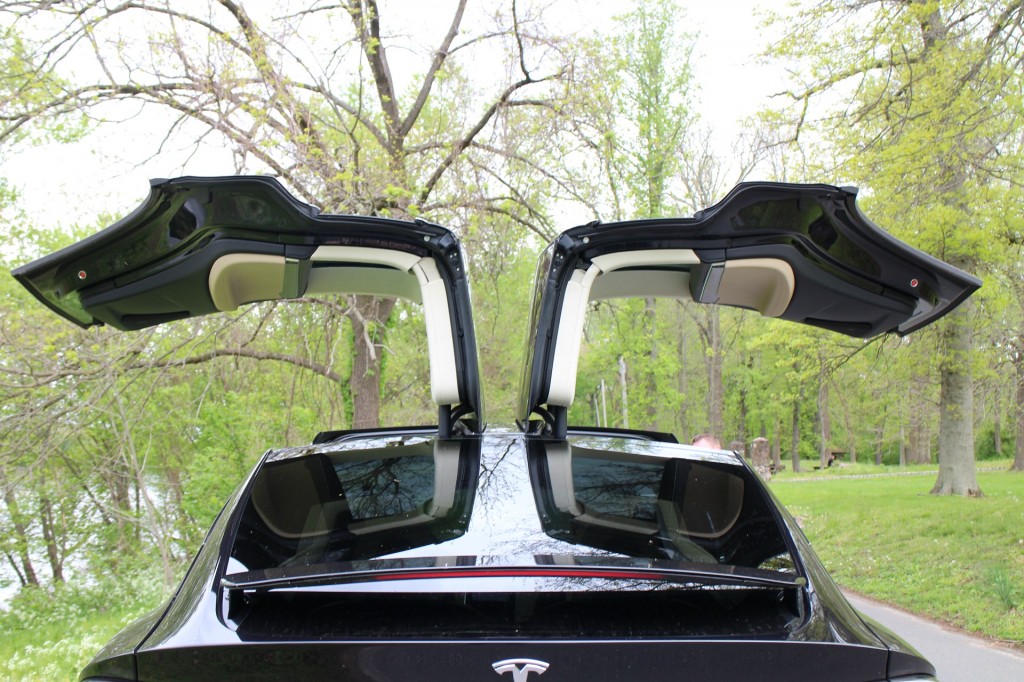
2016 Tesla Model X
The most noticeable feature of the Model X is its falcon doors, which rise from a complicated set of torsion hinges along the center of the roof, and bend between the roof and the window line to keep their lower halves from reaching much beyond the perimeter of the car.
They\’re striking enough that when we stopped for photos at a Supercharger site in a mall parking lot, a woman drove over to ask about the vehicle.
And they make for great photos too.
ALSO SEE: Tesla Model X door-control software to be updated, Musk says
More importantly, while numerous Model X owners have reported misaligned or unreliable doors, those on this particular Model X (one of the first few hundred built) were perfectly aligned and have operated fine, according to the owner.
He did note that the door\’s sensors—which prevent them from contacting adjacent cars, people standing near them, or garage ceilings—occasionally stopped them from opening or closing halfway through.
His family has learned where to stand, he said, while the doors open and close. Meanwhile, Tesla promises a pair of software updates are coming to address this very real challenge.
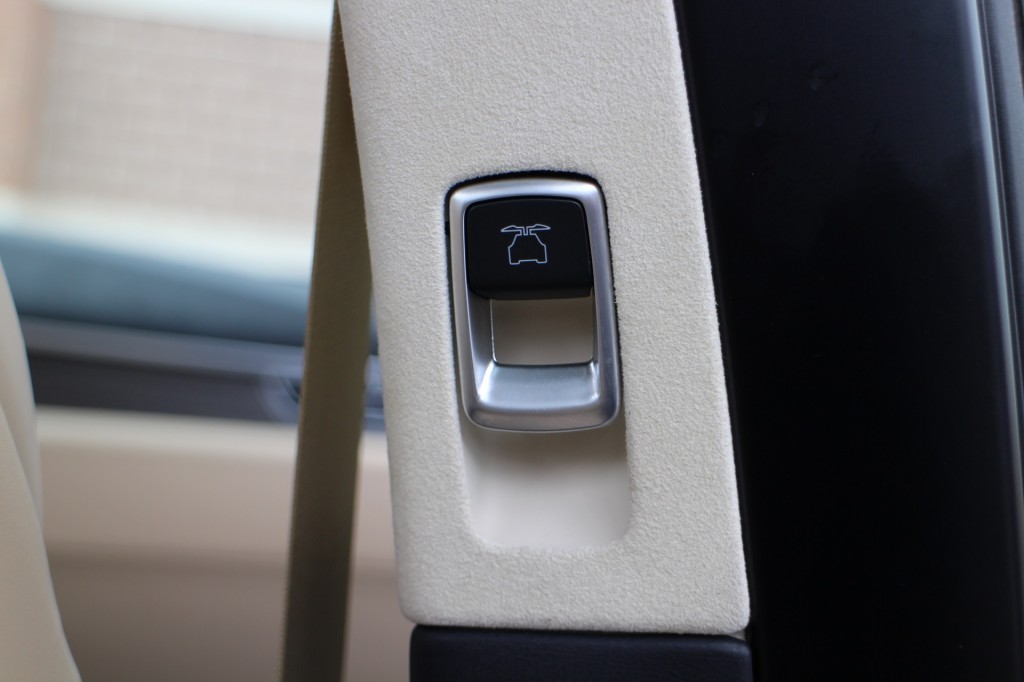
2016 Tesla Model X
We\’d seen falcon doors do their graceful dance at auto shows, but what we hadn\’t expected in real-world use was that they take several seconds to operate in either direction.
That means that putting a bag in the rear passenger compartment from the side, when you get in or out of the front, can take 20 seconds or more—versus perhaps 5 seconds in a car with conventionally hinged doors.
It\’s not a big deal, but we noticed it repeatedly while stowing a camera bag in back at each of several photo stops.
CHECK OUT: Tesla refutes owner claims of Model X \’sudden acceleration\’ before crash
Behind the wheel and on the road, the Tesla Model X drives remarkably like a Model S that happens to have a higher seat position.
With the considerable weight of the 90-kilowatt-hour lithium-ion battery pack plus 762 horsepower worth of electric motors front and rear located about as low as you can go, it corners both fairly flat and very predictably for an SUV.
We found ourselves routinely traveling 5 to 10 miles an hour faster through rural Northeastern lanes than we realized.

2016 Tesla Model X
That said, the Model X is a very heavy vehicle—as much 3 tons if loaded with people—and that\’s evident through the seat of your pants as you maneuver it around corners.
Otherwise, it\’s smooth, quiet, and handles a variety of road surfaces well.
And, yes, we did test the \”Ludicrous\” acceleration mode (an extra-cost option). We didn\’t time it with a stopwatch, but the 3.2 seconds from 0 to 60 mph is likely right.
WATCH THIS: Tesla Model X Vs Tesla Model S: Ludicrous Drag-Strip Faceoff (Video)
Strangely, it seemed slightly less impressive than a similar sprint in the Model S, perhaps because the electric sedan is lighter and closer to the ground, making the experience more immediate.
The Model X is higher, larger, and well insulated enough that we found ourselves wanting a little more drama to the stunning acceleration.
First world problems, clearly.
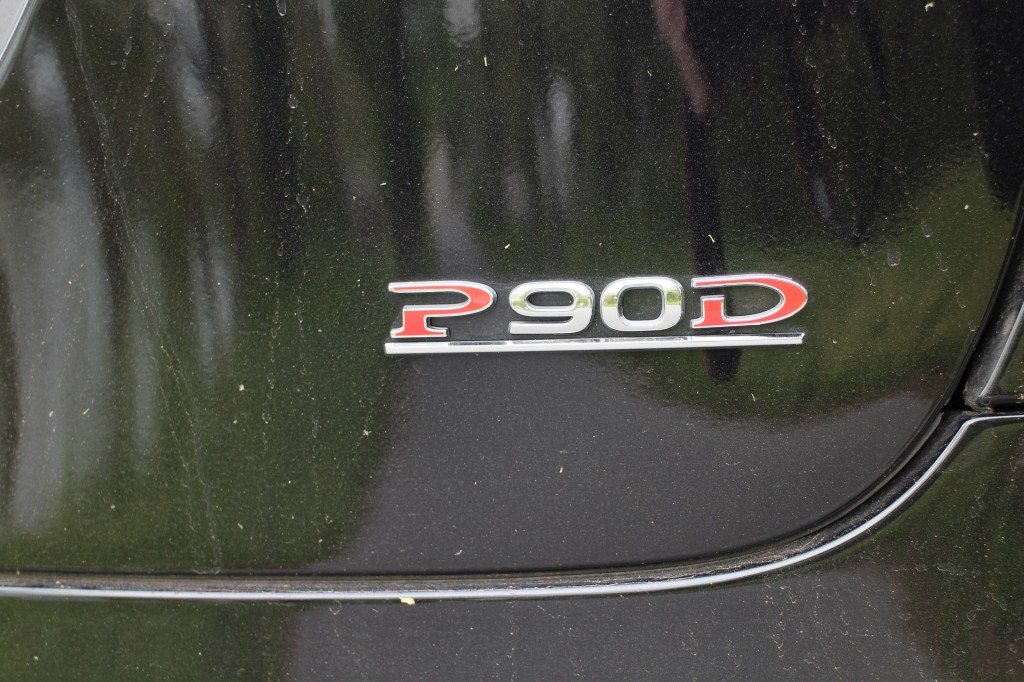
2016 Tesla Model X
Design
Approaching the Model X for the first time, it\’s clearly related to the Model S, but taller and bulkier.
It\’s a graceful design for an SUV—given the rear-window angle, you might be justified in calling it a hatchback—but from certain angles it looks stocky, lacking the feline grace of the lower Model S.
The simple interior of our test car had a tasteful two-tone treatment with black and beige surfaces accented by both matte silver and wood trim.
It doesn\’t approach the elegance of a high-end Mercedes-Benz S-Class sedan of the same price, but it\’s not nearly as stark as the earliest Model S interiors were.
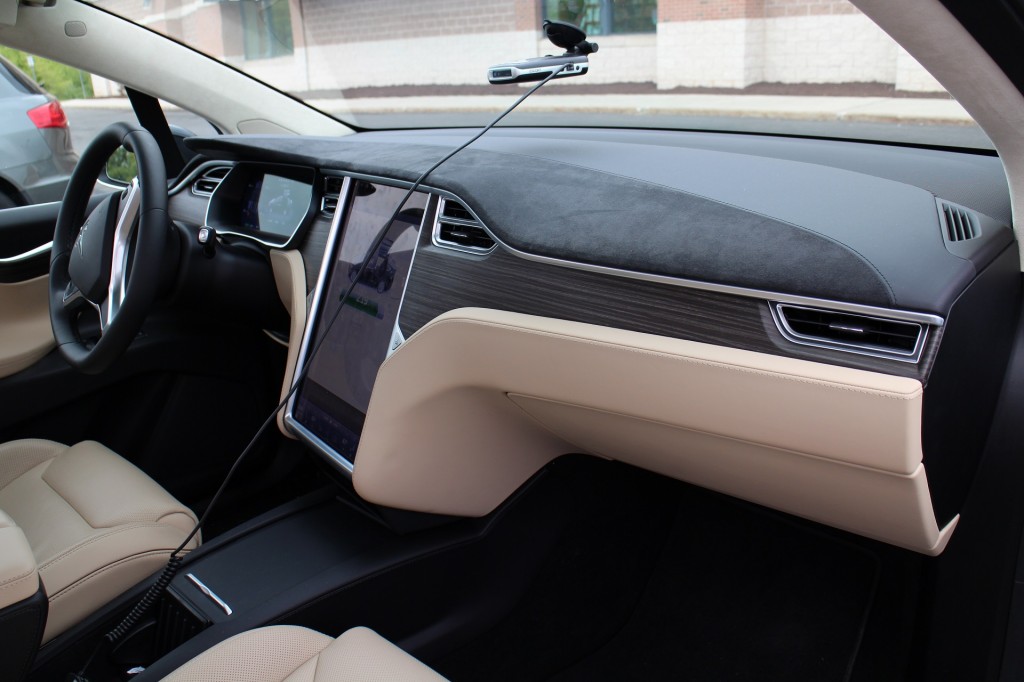
2016 Tesla Model X
The interior storage and amenities, long a Model S weak point, include a center console with an armrest, map pockets and bottle holders in the front doors, six cupholders, and four USB ports.
Overall, it\’s a family-friendly iteration on the Model S.
The panoramic windshield that extends in a single sweep of glass far into the roof is impressive, but depending on how far forward a driver sits, it may not register much from behind the wheel.
Taller drivers who sit back with arms fully extended will notice it more than shorter drivers and those who prefer to be somewhat closer to the wheel.
The sun visors, which unfurl from their position along the windshield pillar and attach magnetically to mounts at the center of the windshield, are an engineering triumph.
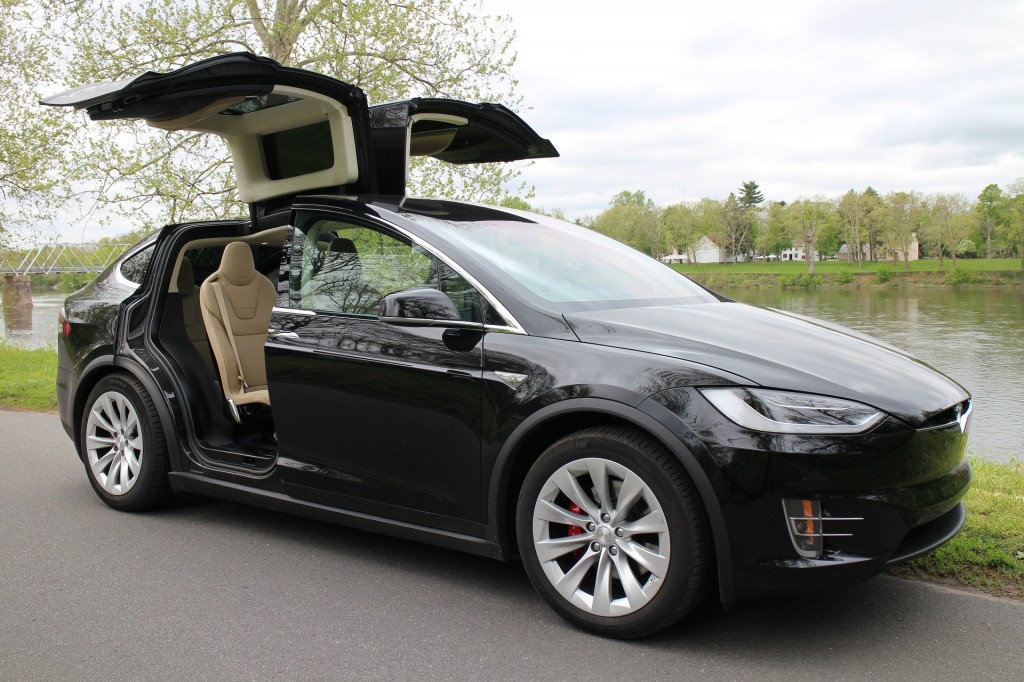
2016 Tesla Model X
We rather wonder if they were one of the items Tesla Motors CEO Elon Musk acknowledged might better, in retrospect, have been postponed to get the Model X launched earlier and with fewer challenges.
Regardless of hindsight, they work fine once you understand how to put them into place.
Lack of flexibility
The main challenge to the Model X\’s claim to be an SUV is in its rear two rows of seating. They\’re comfortable but deliver little of the cargo flexibility expected in a large luxury crossover.
The second row is comprised of either two or three individual seats, each encased in a shiny molded-plastic shell. (We wonder what happens to that surface the first time someone kicks one in a set of golf shoes?)
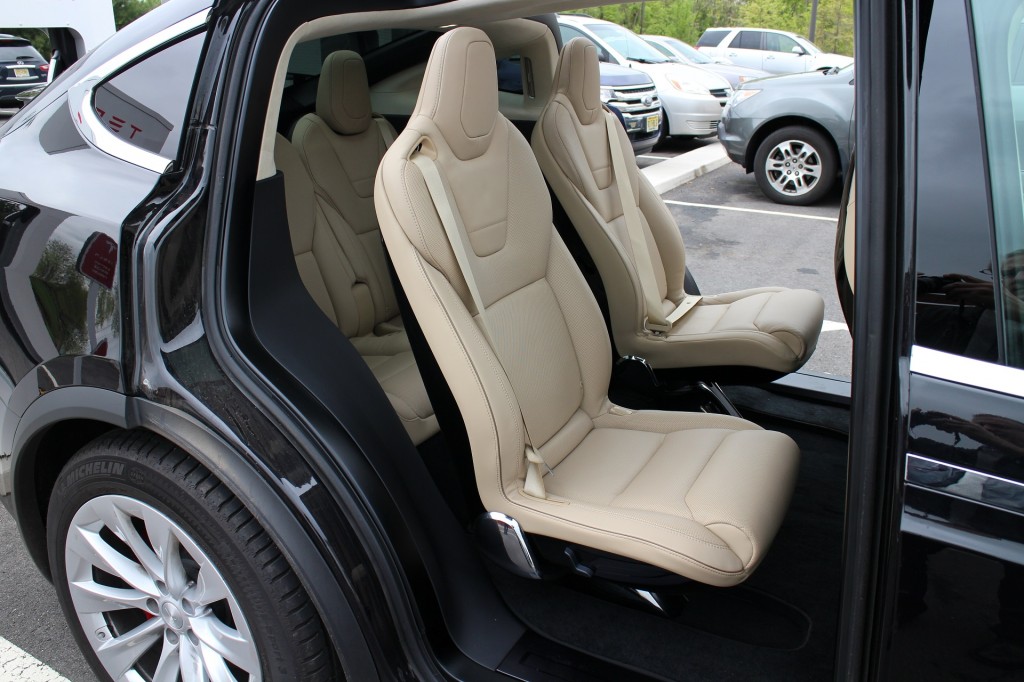
2016 Tesla Model X
Our test car was a six-seater, meaning the middle seat in the second row was deleted.
That position is less usable than the two outboard seats, due to the loss of several inches of headroom occupied by the falcon doors\’ complex mechanism of torsion springs and structural reinforcements above the headliner.
The center gap improves access to the third row—which is suitable for lithe teenagers but may not be all that comfortable for stockier middle-aged men.
The family\’s children reported no issues with comfort or access. (Or so their father said.)
And the width of the falcon doors may offer somewhat better access to the third row than conventional doors, though there\’s still the rear wheel-arch to get over, just as in any three-row vehicle.
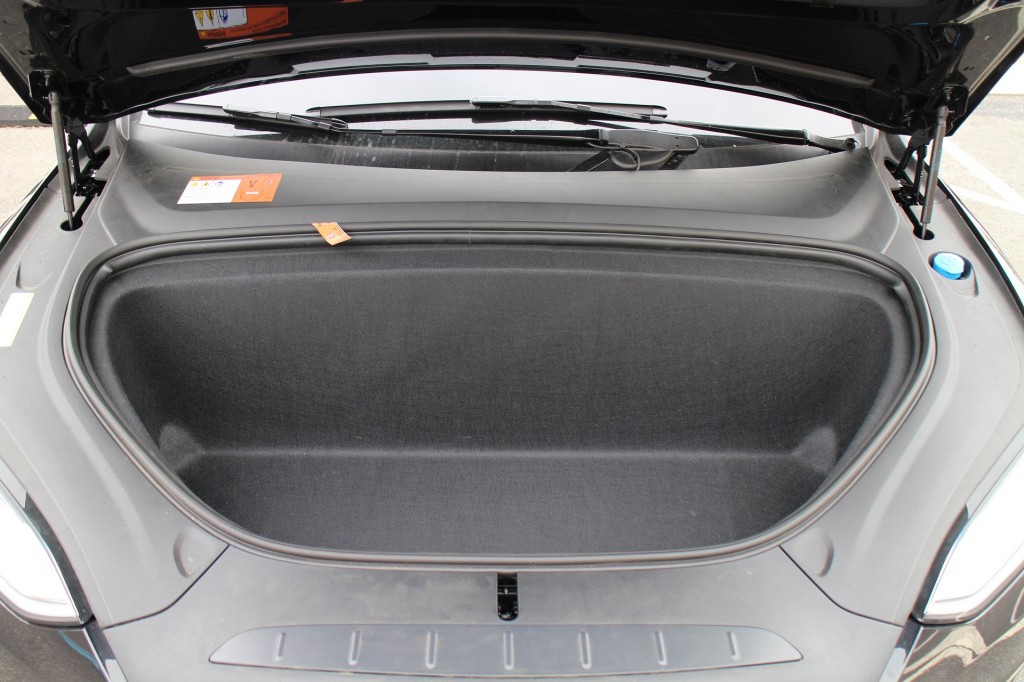
2016 Tesla Model X
The cargo space is limited behind the third row, largely due to the aggressively sloped tailgate.
The pair of third-row seats folds down to open up a more-or-less conventional load bay. There\’s also the front trunk (which Tesla insists on calling a \”frunk\”).
But the second-row seats don\’t fold; they simply slide forward and tilt up electrically to rest against the backs of the front row. The length available for cargo is thus considerably compromised.
Still, Tesla says the Model X contains 40 percent more interior volume than Audi Q7, another large luxury crossover SUV with all-wheel drive.
Will Model X owners want to use it to haul 4×8 sheets of plywood for home-renovation projects? We\’d guess probably not.
Our owner\’s experience has been that it holds a family of six comfortably enough on long road trips that it meets the family\’s needs as a primary vehicle, albeit one with a six-figure price tag.
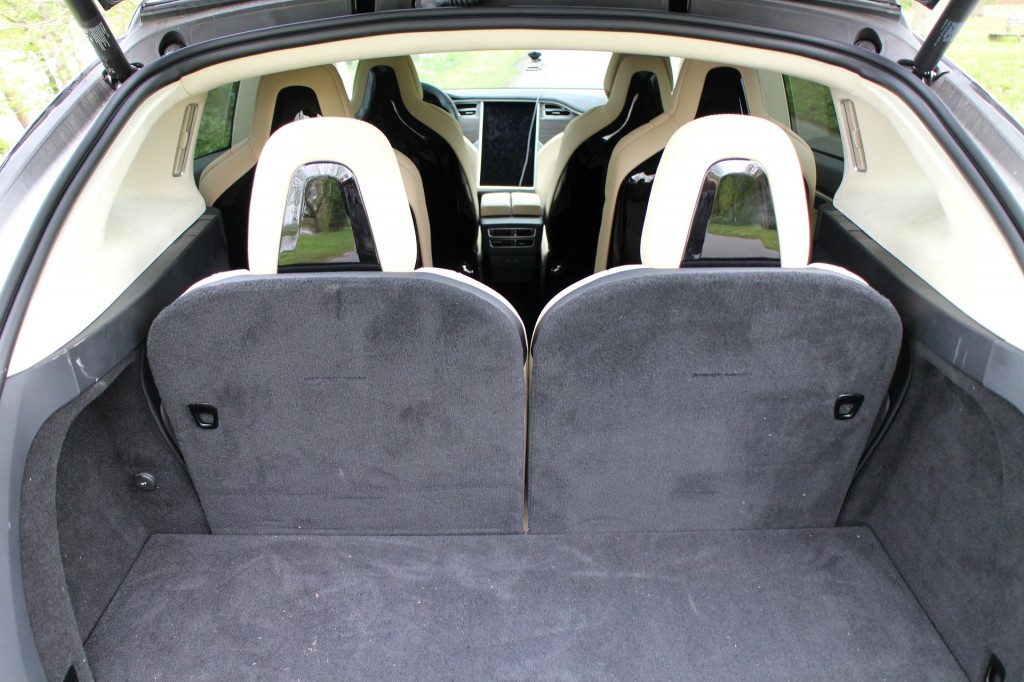
2016 Tesla Model X
We enjoyed our brief time with the car, and the owner who let us drive it has been very happy with his family\’s electric crossover thus far.
Still, we\’re betting that the rumored \”Model Y\” smaller crossover, to be built on Model 3 underpinnings and launched before 2020, won\’t have falcon doors.
_______________________________________
Follow GreenCarReports on Facebook and Twitter.

